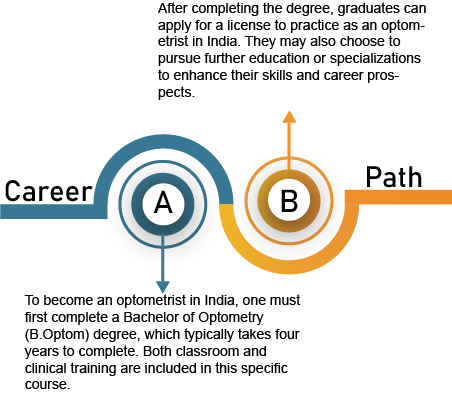Optometry is a healthcare profession that involves the examination, diagnosis, and treatment of eye related problems. Optometrists are primary eye care providers who perform eye exams, prescribe corrective lenses, and provide treatment for a range of eye conditions.

Work description
- An Optometrist performs comprehensive eye exams to assess the visual health of patients.
- They may also prescribe glasses or contact lenses to correct vision problems, as well as treat conditions such as dry eye syndrome, glaucoma, cataracts, and diabetic retinopathy.
- Optometrists may work in private practices, clinics, hospitals, or optical shops. They may also work in research or academia, teaching and conducting research in the field of optometry.
High Demand
The demand for optometrists is high, and it is projected to grow in the future, as the population ages and the need for eye care increases.
Work-life balance
Optometrists typically work regular hours, with little to no on-call or emergency work, allowing for a good work-life balance.
Job satisfaction
Optometrists have a high level of job satisfaction, as they are able to help improve people’s vision and overall eye health.
Autonomy
Optometrists are able to work independently, diagnose and treat eye conditions, and prescribe medications and eyeglasses.
Good income
Optometrists have a good income, making it a good career option.
Education
Becoming an optometrist requires completing a Doctor of Optometry (OD) degree, which can take 4 years of postgraduate study after completing an undergraduate degree.
Debt
The cost of education can be high, and many optometry graduates have significant student loan debt.
Insurance limitations
Insurance limitations can be a challenge, as some insurance companies limit coverage for eye care services and materials.
Limited scope of practice
In some states, optometrists have a limited scope of practice and are not able to perform certain procedures, which may limit their ability to provide comprehensive eye care.
Physical demands
The job can be physically demanding, as optometrists spend a lot of time on their feet, and may need to lift heavy equipment or assist patients with mobility issues.
The cost of pursuing optometry in India varies depending on several factors such as the type of college, the course duration, and the location of the college. Typically, the fees for a four-year Bachelor of Optometry (B.Optom) program in India ranges from Rs. 50,000 to Rs. 3,00,000 per year. Private colleges tend to charge higher fees compared to government colleges. Additionally, students must also consider other expenses such as accommodation, books, and equipment costs. Overall, pursuing optometry in India can cost anywhere between Rs. 2,00,000 to Rs. 12,00,000 or more, depending on the factors mentioned above
[wpcharts type=”horizontalbarchart” bgcolor=”red:gray:yellow,blue:gray:yellow,random:gray:yellow,purple:gray:yellow” min=”0″ legend=”true” titles=”2 year , 5 year” values=”3,7,5,12″]
The salary of an optometrist in India varies depending on their experience, location, and type of practice. On average, an optometrist in India can earn anywhere between 2-7 lakhs INR per year. However, experienced optometrists who specialize in a particular area of eye care may earn higher salaries.
[wpcharts type=”horizontalbarchart” bgcolor=”red:gray:yellow,blue:gray:yellow,random:gray:yellow,purple:gray:yellow” min=”0″ legend=”false” titles=”Entry-Level, Mid-Career, Senior-Level ” values=”5,15,25,35,45,55″]
Strong academic background in math and science
Good communication skills
Attention to detail and precision
Strong critical thinking and problem-solving skills
Ability to work independently as well as part of a team
Good hand-eye coordination and manual dexterity
Strong interpersonal skills to interact with patients and colleagues
Poor eyesight or color vision deficiencies
Inability to handle stress or work under pressure
Lack of interest in science or math
Difficulty with manual dexterity or hand-eye coordination
Poor communication skills
Inability to work with a diverse patient population
Lack of interest in ongoing learning and professional development
Work-life balance
Optometry is a career that generally offers a good work-life balance. Optometrists typically work regular hours, with little to no on-call or emergency work, allowing for a predictable and consistent schedule.
Many optometrists work in private practice or clinics, which may offer flexible scheduling options, such as part-time or reduced hours. This can be beneficial for those seeking to balance their work with personal or family obligations.
Additionally, optometrists have the ability to take vacations and time off as needed, as long as arrangements are made to ensure coverage for their patients. Overall, optometry can be a rewarding career that provides a good balance between work and personal life.

Optometrists play a critical role in helping patients achieve and maintain good vision and eye health, which can improve quality of life and prevent vision loss.
Optometrists contribute to the economy by providing services that are in high demand, and by creating jobs in the healthcare industry.
Optometrists are involved in research and development of new technologies and treatments for eye conditions, which can lead to advancements in the field and better outcomes for patients.
Optometrists can help identify and manage eye diseases and conditions, which can prevent or mitigate public health concerns such as blindness or vision impairment.
Optometrists can educate patients and the public about the importance of eye health and vision care, which can lead to increased awareness and preventative measures being taken.
Pediatric optometry
Optometrists who specialize in pediatric optometry work with children to diagnose and treat eye conditions such as amblyopia (lazy eye) and strabismus (crossed eyes).
Contact lens optometry
Optometrists who specialize in contact lens optometry fit patients with contact lenses and provide ongoing care and management of contact lens wear.
Low vision rehabilitation
Optometrists who specialize in low vision rehabilitation work with patients who have visual impairments that cannot be fully corrected with glasses or contact lenses.
Geriatric Optometry Machine Learning
It involves treatment of common geriatric systemic and ocular diseases.
Conclusion:
In conclusion, optometry is a rewarding and growing field in India that offers opportunities for those interested in eye care. With a range of specializations and good earning potential, optometry is a viable career option for those who enjoy working with patients to improve their vision and eye health.



